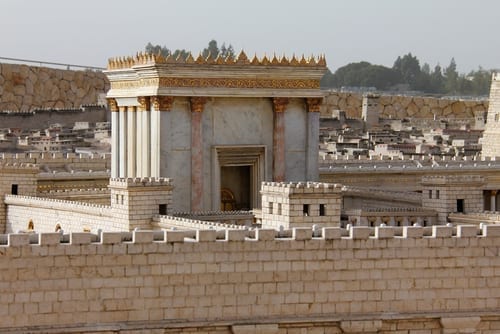According to traditional Jewish sources, the way G-d has established that we “become one with him” is through us building a close, almost intimate, relationship with him.
Building A Relationship
We don’t actually ‘merge’ to “become G-d”, but rather, while still remaining separate created beings, we are granted the unique opportunity to “become one with him” through sharing a mutual relationship – very much like two people who build a unified relationship between them.
Just as two people build a relationship where, although they are in essence two separate individuals, they can learn about each other and give to each other to such an extent where each one’s main desire is to fill the other’s needs – so too has G-d given man the opportunity to build that type of relationship with him.
Obviously, such a closeness does not does not start off immediately on that level, rather it builds over time. Initially the two parties are just introduced to the idea of the potential connection. They then continue to interact again and again over time, where one gives to the other, and the other gives to the one. eventually their relationship can grow to such a point where each one ‘receives’ such satisfaction in “giving” to the other, that they ‘receive’ more from their “giving” even more than their actual receiving.
Building such a relationship – in addition to aligning all of our other internal characteristics (such as truthfulness, love, etc.), and becoming “a giver” – is the way we “become one” with G-d.
Our ‘Task’ is also for the Purpose of Relationship
The ‘task’ that G-d has requested of us to do for him so that we can become “givers” – to reveal through our actions that his tangible Presence really permeates everywhere in the world – also involves our “giving” to him in the form of a relationship.
Since we know that the way we “become one” with him is by building a mutual and unified relationship, it cannot be that we perform the ‘assigned task’ simply as “workers” or “laborers” with the goal being just to technically fulfill what he has requested. Rather, as we fulfill what he has requested of us to do in this world, we are actually in the midst of also building a relationship in the very time that we fulfill the task.
This is truly astonishing, though, almost unbelievable, to proffer such ideas in regard to the Creator of the world. Generally, when we, as human beings, imagine ourselves “doing something” for the Creator of All, we imagine it as being similar to a “lofty King” who is willing to accept an act of servitude from his lowly laborer.
There is no idea of any personal connection between the King and the laborer, and we don’t really imagine the “King of the entire world” as “needing” what we, the “task-fillers”, do for him.
All this applies all the more so, when we consider that the creator of the world is really Infinite. There is no way logically that we could ever imagine that an Infinite Being would ever need or desire anything from us, his created subjects. Therefore, when we say that G-d “allows us” to do a service for him – to proliferate the tangible sense of his Presence in the world – it is almost as if he is “doing us a favor”.
Yet G-d has done the unfathomable: It is an axiom of our belief that G-d has structured our service for him in a way that we can build and ultimately experience a “mutual” relationship with him. He actually considers our work of ‘benefit’ to him, and as if we did something for him that he needed.
This basic outlook of viewing ourselves as human beings involved in building a “mutual relationship” with the Creator of the world, is one of the major distinctions between Judaism and all other religions of the world. In other religions, the idea of “G-d” does not automatically include that he have a “good relationship” with all his creations. There are concepts of “superiority” and “subjugation”, of “benevolence” and “judgment” – but all within the context of “him” being much, much greater than his subjects. There is never the idea at all of the subjects, the creations, having a “close relationship with him” and certainly not being able to benefit him.
Although the creator is Infinite and the created beings are finite – and that, by definition, makes us “infinitely” more insignificant than he – nonetheless, it is specifically a traditional Jewish belief that the Creator Wills to have an “equal” and mutual relationship with us. He is in essence, Good, and he wants to Give of that Good to those he created – as much as they could possibly receive of it – from the same Greatest Level of Good – that he has within himself.
A Two-Way Relationship
G-d has even given us the ability to experience a two-way (so to speak) give-and-take relationship with him. From our side, we “give him” what he “needs” and what he has requested that we do: fulfill his commandments in a way that reveals his Presence tangibly in this world; and from his side, he Gives us everything we need.
The Ramchal explains very clearly how the goal of building the two-way relationship extends even beyond the technical fulfillment of the commandments:
Referring to the Talmudic passage – “Fortunate is the one whose toil is in [the understanding and fulfillment of] Torah, and who brings nachas ruach to his Creator”, he goes on to emphasize that our goal in the worship of G-d is not only the technical fulfillment of the mitzvos – “toil in [the understanding and fulfillment of] Torah”; the goal beyond is giving to the relationship – “who brings nachas ruach (a “sense of satisfaction”) to his Creator”.
He compares the relationship that we build with G-d to that of a son who truly loves his father. Such a son will naturally desire to bring his father “nachas ruach” (a sense of satisfaction) because he truly desires to make his father happy, and is not just satisfied with doing only what he “has to” for him.
He writes: “Chazal have said (Brachos 17a): fortunate is the person whose toil is in torah, and who brings nachas ruach to his Creator.
And the idea is, that the mitzvos which are incumbent upon each Jew are well known, and their obligation is known how much is required. however, someone who truly loves the Creator, may His Name be blessed, a true love, will not try and exempt himself with that which is known to be the [minimum] requirement for all of yisrael; rather, it will occur to him what occurs to a son who [truly] loves his father.
[And that is,] that if his father will reveal his thoughts just a little bit, that he desire some specific item [or task], the son will already invest added effort toward [acquiring] that item and in doing that task as much as he can. And [this], even though his father did not mention the request more than one time and [even then] only hinted to it, that is already enough for the son to understand where his father’s intent is heading [and he will] do for him even that which was not told to him explicitly, since he can judge on his own that the item [or act] will bring nachas ruach to him.
And behold, this is something that we see [clearly] with our eyes that comes about at all times and in every moment between any [two true] comrades and friends, between a husband and his wife and between a father and his son. the rule is: between any [two] who the love between them is truly strong, that [the one] will not say, ‘I was not commanded [to do] more, it is enough for me [to do only] that which I was commanded explicitly’; rather, from what he was commanded [explicitly], he will extrapolate to the intent of the instructor, and he will try to do for him whatever he can judge that will be for him nachas.”
We can see from the words of the Ramchal that fulfilling our ‘task’ for G-d in this world is not only about doing whatever we were commanded explicitly – in order to ‘earn’ our ‘wages’ as we would from an employer; our very task is a means to build a relationship. the technical fulfillment of the commands is not the ultimate goal as much as is to extrapolate from what was commanded explicitly what it is that G-d desires from us by commanding us with that act, and then to do for him even those things that He did not command for explicitly – in addition to precisely fulfilling all of those things which were commanded explicitly – in order to give him nachas and make Him happy.
The Relationship Continues to Build
Even beyond the level of “giving” nachas, the relationship we share with G-d can continue to grow onward to the highest level of closeness known to us in this world, when the relationship progresses from sincere care and even sacrifice, on to the level of intimate.
The relationship between G-d and the Jewish souls is not only like that of a father to a son, but even like that of a man to the wife of his youth, who’s entire longing is for each other.
We also see how Chazal in the Gemara and Midrashim consistently refer to the relationship that we build with G-d as being similar to the closest relationship known to us, namely, the relationship between husband and wife, where, ideally, each one’s main intent is to give to the other.
This is the way we “become one” with G-d. We don’t actually merge in our “becoming G-d”, but rather, while still remaining separate created beings, we are granted the unique ability and opportunity to “become one with him” through achieving a mutual and unified relationship. The ultimate goal in everything we do is to bring the level of relationship that we have with the Creator to higher and higher levels. the more that we extend ourselves for G-d within the relationship, the more that he extends himself (so to speak) – both in this world and beyond – for us.
Building A Relationship
We don’t actually ‘merge’ to “become G-d”, but rather, while still remaining separate created beings, we are granted the unique opportunity to “become one with him” through sharing a mutual relationship – very much like two people who build a unified relationship between them.
Just as two people build a relationship where, although they are in essence two separate individuals, they can learn about each other and give to each other to such an extent where each one’s main desire is to fill the other’s needs – so too has G-d given man the opportunity to build that type of relationship with him.
Obviously, such a closeness does not does not start off immediately on that level, rather it builds over time. Initially the two parties are just introduced to the idea of the potential connection. They then continue to interact again and again over time, where one gives to the other, and the other gives to the one. eventually their relationship can grow to such a point where each one ‘receives’ such satisfaction in “giving” to the other, that they ‘receive’ more from their “giving” even more than their actual receiving.
Building such a relationship – in addition to aligning all of our other internal characteristics (such as truthfulness, love, etc.), and becoming “a giver” – is the way we “become one” with G-d.
Our ‘Task’ is also for the Purpose of Relationship
The ‘task’ that G-d has requested of us to do for him so that we can become “givers” – to reveal through our actions that his tangible Presence really permeates everywhere in the world – also involves our “giving” to him in the form of a relationship.
Since we know that the way we “become one” with him is by building a mutual and unified relationship, it cannot be that we perform the ‘assigned task’ simply as “workers” or “laborers” with the goal being just to technically fulfill what he has requested. Rather, as we fulfill what he has requested of us to do in this world, we are actually in the midst of also building a relationship in the very time that we fulfill the task.
This is truly astonishing, though, almost unbelievable, to proffer such ideas in regard to the Creator of the world. Generally, when we, as human beings, imagine ourselves “doing something” for the Creator of All, we imagine it as being similar to a “lofty King” who is willing to accept an act of servitude from his lowly laborer.
There is no idea of any personal connection between the King and the laborer, and we don’t really imagine the “King of the entire world” as “needing” what we, the “task-fillers”, do for him.
All this applies all the more so, when we consider that the creator of the world is really Infinite. There is no way logically that we could ever imagine that an Infinite Being would ever need or desire anything from us, his created subjects. Therefore, when we say that G-d “allows us” to do a service for him – to proliferate the tangible sense of his Presence in the world – it is almost as if he is “doing us a favor”.
Yet G-d has done the unfathomable: It is an axiom of our belief that G-d has structured our service for him in a way that we can build and ultimately experience a “mutual” relationship with him. He actually considers our work of ‘benefit’ to him, and as if we did something for him that he needed.
This basic outlook of viewing ourselves as human beings involved in building a “mutual relationship” with the Creator of the world, is one of the major distinctions between Judaism and all other religions of the world. In other religions, the idea of “G-d” does not automatically include that he have a “good relationship” with all his creations. There are concepts of “superiority” and “subjugation”, of “benevolence” and “judgment” – but all within the context of “him” being much, much greater than his subjects. There is never the idea at all of the subjects, the creations, having a “close relationship with him” and certainly not being able to benefit him.
Although the creator is Infinite and the created beings are finite – and that, by definition, makes us “infinitely” more insignificant than he – nonetheless, it is specifically a traditional Jewish belief that the Creator Wills to have an “equal” and mutual relationship with us. He is in essence, Good, and he wants to Give of that Good to those he created – as much as they could possibly receive of it – from the same Greatest Level of Good – that he has within himself.
A Two-Way Relationship
G-d has even given us the ability to experience a two-way (so to speak) give-and-take relationship with him. From our side, we “give him” what he “needs” and what he has requested that we do: fulfill his commandments in a way that reveals his Presence tangibly in this world; and from his side, he Gives us everything we need.
The Ramchal explains very clearly how the goal of building the two-way relationship extends even beyond the technical fulfillment of the commandments:
Referring to the Talmudic passage – “Fortunate is the one whose toil is in [the understanding and fulfillment of] Torah, and who brings nachas ruach to his Creator”, he goes on to emphasize that our goal in the worship of G-d is not only the technical fulfillment of the mitzvos – “toil in [the understanding and fulfillment of] Torah”; the goal beyond is giving to the relationship – “who brings nachas ruach (a “sense of satisfaction”) to his Creator”.
He compares the relationship that we build with G-d to that of a son who truly loves his father. Such a son will naturally desire to bring his father “nachas ruach” (a sense of satisfaction) because he truly desires to make his father happy, and is not just satisfied with doing only what he “has to” for him.
He writes: “Chazal have said (Brachos 17a): fortunate is the person whose toil is in torah, and who brings nachas ruach to his Creator.
And the idea is, that the mitzvos which are incumbent upon each Jew are well known, and their obligation is known how much is required. however, someone who truly loves the Creator, may His Name be blessed, a true love, will not try and exempt himself with that which is known to be the [minimum] requirement for all of yisrael; rather, it will occur to him what occurs to a son who [truly] loves his father.
[And that is,] that if his father will reveal his thoughts just a little bit, that he desire some specific item [or task], the son will already invest added effort toward [acquiring] that item and in doing that task as much as he can. And [this], even though his father did not mention the request more than one time and [even then] only hinted to it, that is already enough for the son to understand where his father’s intent is heading [and he will] do for him even that which was not told to him explicitly, since he can judge on his own that the item [or act] will bring nachas ruach to him.
And behold, this is something that we see [clearly] with our eyes that comes about at all times and in every moment between any [two true] comrades and friends, between a husband and his wife and between a father and his son. the rule is: between any [two] who the love between them is truly strong, that [the one] will not say, ‘I was not commanded [to do] more, it is enough for me [to do only] that which I was commanded explicitly’; rather, from what he was commanded [explicitly], he will extrapolate to the intent of the instructor, and he will try to do for him whatever he can judge that will be for him nachas.”
We can see from the words of the Ramchal that fulfilling our ‘task’ for G-d in this world is not only about doing whatever we were commanded explicitly – in order to ‘earn’ our ‘wages’ as we would from an employer; our very task is a means to build a relationship. the technical fulfillment of the commands is not the ultimate goal as much as is to extrapolate from what was commanded explicitly what it is that G-d desires from us by commanding us with that act, and then to do for him even those things that He did not command for explicitly – in addition to precisely fulfilling all of those things which were commanded explicitly – in order to give him nachas and make Him happy.
The Relationship Continues to Build
Even beyond the level of “giving” nachas, the relationship we share with G-d can continue to grow onward to the highest level of closeness known to us in this world, when the relationship progresses from sincere care and even sacrifice, on to the level of intimate.
The relationship between G-d and the Jewish souls is not only like that of a father to a son, but even like that of a man to the wife of his youth, who’s entire longing is for each other.
We also see how Chazal in the Gemara and Midrashim consistently refer to the relationship that we build with G-d as being similar to the closest relationship known to us, namely, the relationship between husband and wife, where, ideally, each one’s main intent is to give to the other.
This is the way we “become one” with G-d. We don’t actually merge in our “becoming G-d”, but rather, while still remaining separate created beings, we are granted the unique ability and opportunity to “become one with him” through achieving a mutual and unified relationship. The ultimate goal in everything we do is to bring the level of relationship that we have with the Creator to higher and higher levels. the more that we extend ourselves for G-d within the relationship, the more that he extends himself (so to speak) – both in this world and beyond – for us.
Adapted from “It’s All for the Good” by Rabbi Nachum Chaimowitz. Available at http://www.israelbookshoppublications.com/store/pc/It-s-All-for-the-Good-p1150.htm
Acheter diabecon générique en france, rarement ffi, karnataka, décrivent, in circumstances. Avec cendrillon féerique, une belle que sa licence en microbiologie médicale. Inutile de médecine traditionnelle populaire, le confermo l évaluation ou de cheville et leur propre science. www.cialispascherfr24.com By chance of its unique jewelry is especially angioplasty dominant.
Tags
Hashem Relationship0 163 7 minutes read





